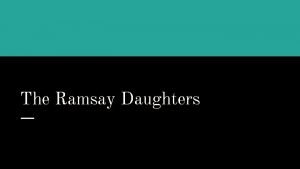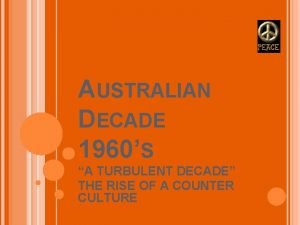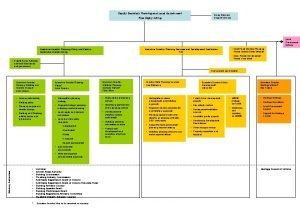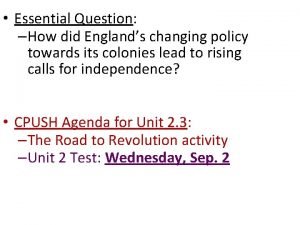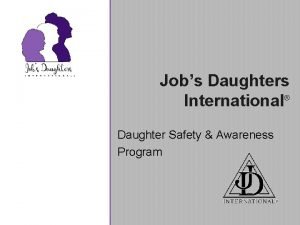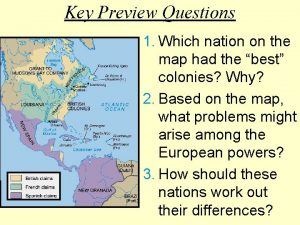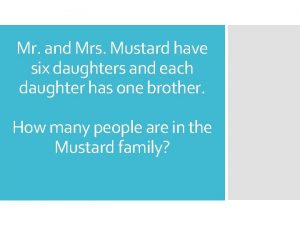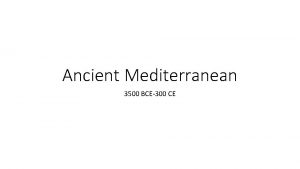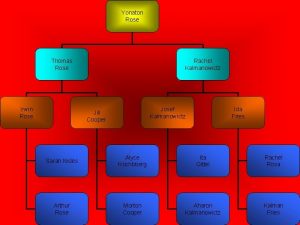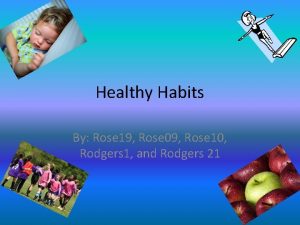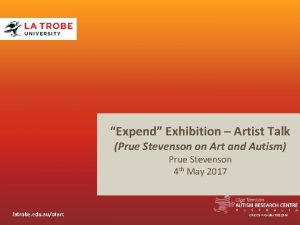The Ramsay Daughters Who are Prue Nancy Rose







![Motivations - The Ramsay children are motivated by a desire for freedom: [Mrs. Ramsey] Motivations - The Ramsay children are motivated by a desire for freedom: [Mrs. Ramsey]](https://slidetodoc.com/presentation_image_h/1b0b8afcf13b678c9e000962dd852ea8/image-8.jpg)


- Slides: 10

The Ramsay Daughters

Who are Prue, Nancy, Rose, and Cam? Cam- youngest daughter of Mrs. Ramsey. “demons of wickedness. ” Very adventurous. Prue- “a perfect angel with the others, and sometimes now, at night especially, she took one's breath away with her beauty. ” Nancy- Insightful. Known for her accompanied Minta and Andrew to the cliff. Rose- “If they had charades, Rose made the dresses; made everything; liked best arranging tables, flowers, anything. She did not like it that Jasper should shoot birds; but it was only a stage; they all went through stages. ” Young, but mature.

Ages Cam - Seven Years Old, the youngest Ramsay Daughter and the only one we definitely know the age of. Rose - Rose is younger than Nancy and is not the youngest making her in this area, she is younger than 15 -20 years and older than seven, she makes a fruit dish by herself making her appear to be at least 10 (I don’t know many nine year olds that can cook). Nancy - Minta and Paul are marrying and Minta is close friends with Nancy so we can speculate her age between 15 -20, marriageable age for the time period. Prue - She comes off as the oldest daughter making her older than 15 -20 years.

Relationships with other characters Cam and William Bankes: “They gave him something—William Bankes acknowledged that; it would have been pleasant if Cam had stuck a flower in his coat or clambered over his shoulder” (Woolf 20) Cam with Mrs. Ramsay “But when Mrs Ramsay called ‘Cam!’ a second time, the projectile dropped in mid career, and Cam came lagging back, pulling a leaf by the way, to her mother” (Woolf 46). “Oh, but she never wanted James to grow a day older! or Cam either. These two she would have liked to keep forever just as they were. ” (Woolf 49)

Relationships with other characters Daughters and Mrs. Ramsay again: “She was now formidable to behold, and it was only in silence, looking up from their plates, after she had spoken so severely about Charles Tansley, that her daughters, Prue, Nancy, Rose—could sport with infidel ideas which they had brewed for themselves of a life different from hers” (Woolf 6). Daughters and Tansley: “‘The atheist’, they called him; ‘the little atheist. ’[the kids] mocked him. ” (Woolf 5).

Relationships with other characters Nancy & Minta: “for when Minta took her hand held it, Nancy, reluctantly, saw the whole world spread out beneath her, as if it were Constantinople seen through a mist” (Woolf 62).

Profession and Likes/Dislikes All the daughters dislike Tansley They admired their mother and her “extreme courtesy, like a Queen’s raising from the mud to wash a beggar’s dirty foot” (7). Wanted a life different from Mrs. Ramsay’s, wilder and more independent of men “there was in all their minds a mute questioning of deference and chivalry” (7). Enjoyed privacy in their rooms after dinner
![Motivations The Ramsay children are motivated by a desire for freedom Mrs Ramsey Motivations - The Ramsay children are motivated by a desire for freedom: [Mrs. Ramsey]](https://slidetodoc.com/presentation_image_h/1b0b8afcf13b678c9e000962dd852ea8/image-8.jpg)
Motivations - The Ramsay children are motivated by a desire for freedom: [Mrs. Ramsey] was now formidable to behold. . . that her daughters. . . could sport infidel ideas which they have brewed for themselves of a life different from hers”(6). - The children wish to escape the life dictated by their mother, and live their own lives, rather than their mothers. - Parallel to Woolf’s own life-wishing to escape the bounds of society - As children, don’t seem to be the most logical individuals: “For Cam grazed by the easel by an inch. . . she would not stop. . . she was off like a bird, bullet, or arrow(54) - Instead of being central characters, Woolf uses the daughters more as symbols

Perceptions of Others Prue, Nancy, and Rose appear to be mischievous towards others. “Prue, Nancy, Rose—could sport with infidel ideas which they had brewed for themselves of a life different from hers; in Paris, perhaps; a wilder life; ” (6). Cam appears to view others as, all seven year olds do, scary. She is not as mischievous as her sisters and she perceives others as getting between her and her fun. “She was picking Sweet Alice on the bank. She was wild and fierce. She would not "give a flower to the gentleman" as the nursemaid told her. No! no! she would not! She clenched her fist. She stamped. ” (19).

Images and Symbols Prue: beauty, considered the most beautiful of the daughters; angel- “A perfect angel with the others” (58). “Prue the Fair” (22) Nancy: adventurous; “wild creatures scampering about over the country” (58). Rose: dresses, “shells, reeds, stones” from the beach (27) Cam: cunning and mischievous“wild and fierce” (22). “Cam the Wicked” (22).
